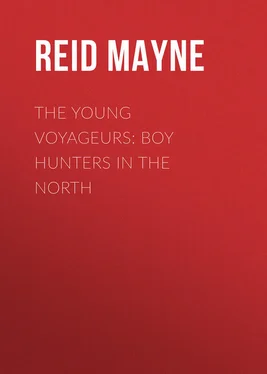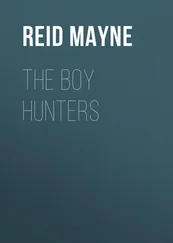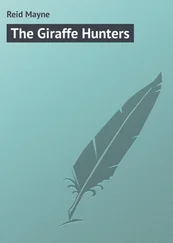Mayne Reid - The Young Voyageurs - Boy Hunters in the North
Здесь есть возможность читать онлайн «Mayne Reid - The Young Voyageurs - Boy Hunters in the North» — ознакомительный отрывок электронной книги совершенно бесплатно, а после прочтения отрывка купить полную версию. В некоторых случаях можно слушать аудио, скачать через торрент в формате fb2 и присутствует краткое содержание. Жанр: literature_19, foreign_antique, foreign_prose, foreign_children, на английском языке. Описание произведения, (предисловие) а так же отзывы посетителей доступны на портале библиотеки ЛибКат.
- Название:The Young Voyageurs: Boy Hunters in the North
- Автор:
- Жанр:
- Год:неизвестен
- ISBN:нет данных
- Рейтинг книги:5 / 5. Голосов: 1
-
Избранное:Добавить в избранное
- Отзывы:
-
Ваша оценка:
- 100
- 1
- 2
- 3
- 4
- 5
The Young Voyageurs: Boy Hunters in the North: краткое содержание, описание и аннотация
Предлагаем к чтению аннотацию, описание, краткое содержание или предисловие (зависит от того, что написал сам автор книги «The Young Voyageurs: Boy Hunters in the North»). Если вы не нашли необходимую информацию о книге — напишите в комментариях, мы постараемся отыскать её.
The Young Voyageurs: Boy Hunters in the North — читать онлайн ознакомительный отрывок
Ниже представлен текст книги, разбитый по страницам. Система сохранения места последней прочитанной страницы, позволяет с удобством читать онлайн бесплатно книгу «The Young Voyageurs: Boy Hunters in the North», без необходимости каждый раз заново искать на чём Вы остановились. Поставьте закладку, и сможете в любой момент перейти на страницу, на которой закончили чтение.
Интервал:
Закладка:
The voice of Norman was heard exclaiming, “Hold with your oars! – the rapids! – the rapids!” At the same time he himself was seen rising up and stretching forward for an oar. All was now consternation; and the movements of the party naturally consequent upon such a sudden panic shook the little craft until her gunwales lipped the water. At the same time she had swung round, until the light again showed the stream ahead, and a horrid sight it was. Far as the eye could see was a reach of foaming rapids. Dark points of rocks, and huge black boulders, thickly scattered in the channel, jutted above the surface; and around and against these, the water frothed and hissed furiously. There was no cataract, it is true – there is none such in Red River – but for all purposes of destruction the rapids before them were equally dangerous and terrible to the eyes of our voyageurs. They no longer thought of the swans. The dead were permitted to float down unheeded, the wounded to make its escape. Their only thought was to stop the canoe before it should be carried upon the rapids.
With this intent all had taken to the oars, but in spite of every exertion they soon found that the light craft had got within the influence of the strong current, and was sucked downward more rapidly than ever. Their backward strokes were to no purpose.
In a few seconds the canoe had passed over the first stage of the rapids, and shot down with the velocity of an arrow. A huge boulder lay directly in the middle of the channel, and against this the current broke with fury, laving its sides in foaming masses. The canoe was hurried to this point; and as the light was again turned up-stream, none of the voyageurs could see this dangerous rock. But they could not have shunned it then. The boat had escaped from their control, and spun round at will. The rock once more came under the light, but just as the canoe, with a heavy crash, was driven against it.
For some moments the vessel, pressed by the current against the rock, remained motionless, but her sides were stove in, and the water was rushing through. The quick eye of Basil – cool in all crises of extreme danger – perceived this at a glance. He saw that the canoe was a wreck, and nothing remained but to save themselves as they best might. Dropping the oar, and seizing his rifle, he called to his companions to leap to the rock: and all together immediately sprang over the gunwale. The dog Marengo followed after.
The canoe, thus lightened, heeled round into the current, and swept on. The next moment she struck another rock, and was carried over on her beams. The water then rushed in – the white bodies of the swans, with the robes, blankets, and implements, rose on the wave; the blazing knots were spilled from the pan, and fell with a hissing sound: and a few seconds after they were extinguished, and all was darkness!
Chapter Seven.
A Bridge of Buckskin
The canoe was lost, and all it had contained, or nearly all. The voyageurs had saved only their guns, knives, and the powder-horns and pouches, that had been attached to their persons. One other thing had been saved – an axe which Basil had flung upon the rock as he stepped out of the sinking vessel. All the rest – robes, blankets, swans, cooking utensils, bags of provisions, such as coffee, flour, and dried meat – were lost – irrecoverably lost. These had either drifted off upon the surface, or been carried under water and hidden among the loose stones at the bottom. No matter where, they were lost; and our voyageurs now stood on a small naked rock in the middle of the stream, with nothing left but the clothes upon their backs, and the arms in their hands. Such was their condition.
There was something so sudden and awful in the mishap that had befallen them, that for some minutes they stood upon the spot where they had settled without moving or addressing a word to one another. They gazed after the canoe. They knew that it was wrecked, although they could see nothing either of it or its contents. Thick darkness enveloped them, rendered more intense from the sudden extinction of the torchlight. They saw nothing but the foam flickering along the river; like the ghosts of the swans they had killed, and they heard only the roaring of the water, that sounded in their ears with a hoarse and melancholy wail.
For a long time they stood impressed with the lamentable condition into which the accident had plunged them; and a lamentable condition it was, sure enough. They were on a small rock in the midst of a rapid river. They were in the midst of a great wilderness too, many long miles from a settlement. The nearest could only be reached by travelling through pathless forests, and over numerous and deep rivers. Impassable swamps, and lakes with marshy shores, lay on the route, and barred the direct course, and all this journey would have to be made on foot.
But none of our young voyageurs were of that stamp to yield themselves to despair. One and all of them had experienced perils before – greater even than that in which they now stood. As soon, therefore, as they became fully satisfied that their little vessel was wrecked, and all its contents scattered, instead of despairing, their first thoughts were how to make the best of their situation.
For that night, at least, they were helpless. They could not leave the rock. It was surrounded by rapids. Sharp, jagged points peeped out of the water, and between these the current rushed with impetuosity. In the darkness no human being could have crossed to either shore in safety. To attempt it would have been madness, and our voyageurs soon came to this conclusion. They had no other choice than to remain where they were until the morning; so, seating themselves upon the rock, they prepared to pass the night.
They sat huddled close together. They could not lie down – there was not room enough for that. They kept awake most of the night, one or other of them, overcome by fatigue, occasionally nodding over in a sort of half-sleep, but awakening again after a few minutes’ uncomfortable dreaming. They talked but little, as the noise of the rushing rapids rendered conversation painful. To be heard, they were under the necessity of shouting to one another, like passengers in an omnibus. It was cold, too. None of them had been much wetted in escaping from the canoe; but they had saved neither overcoat, blanket, nor buffalo-robe; and, although it was now late in the spring, the nights near Lake Winnipeg, even at that season, are chilly. They were above the latitude of 50 degrees; and although in England, which is on that parallel, it is not very cold of a spring night, it must be remembered that the line of equal temperature – in the language of meteorologists the “ isothermal line ,” – is of a much lower latitude in America than in Europe.
Another fact worth remembering is, that upon the eastern or Atlantic coast of the American Continent it is much colder in the same latitude than on the western or Pacific side. The Pacific “sea-board” in its climate is more like the western edge of the old continent. This would seem to indicate that the climate of a coast country is much influenced by the side upon which the ocean lies, whether east or west. This in reality is the case, for you may observe on your map that the western coasts of both the “old world” and the “new” are somewhat similarly placed in regard to their oceans, and hence the similarity of their climates.
There are many other causes connected with this; such as the direction of winds, and the different effects produced by them on the atmosphere when they have passed over water or over land. It was, and is still by many people believed, that the winds are produced by the air becoming heated in a particular place, and then ascending, and leaving a “vacuum” into which the colder air rushes from all sides around. This “rushing,” it was supposed, made the wind. To some extent this theory is true, but there are several other causes that operate in producing wind. Electricity – an agent hitherto but little known, but one of the most important elements of our Earth – has much to do with the winds; and the revolution of the Earth on its own axis has also an influence upon them. Indeed it is to be wondered at, that mankind should have so long remained satisfied with the very unsatisfactory theory of the heated air . But it is not to be wondered at either, when we consider how little mankind has had to do with these things – when we consider that as yet nearly every country upon the face of the globe is despotic; that the whole time of the great body of the people is occupied in a struggle for life – occupied in toiling for a few, who by the most cunning devices rob them of the fruits of their toils – rob them so skilfully that the poor blinded masses have grown to consider eternal toil as the natural state of man – nay more, are ready to persecute him who would elevate them, and worship him who would sink them deeper in baseness and bondage; – when we reflect on this almost hopeless darkness of soul that has marked the history of the past, and is too much the character of the present, we need not wonder that so few have had either leisure or inclination to yield themselves to the acquirement or prosecution of scientific knowledge. “The winds have blown where they listed, and we have heard the sound thereof,” but men absorbed in the hard struggle of life have found but little time to inquire “whence they come or whither they go.”
Читать дальшеИнтервал:
Закладка:
Похожие книги на «The Young Voyageurs: Boy Hunters in the North»
Представляем Вашему вниманию похожие книги на «The Young Voyageurs: Boy Hunters in the North» списком для выбора. Мы отобрали схожую по названию и смыслу литературу в надежде предоставить читателям больше вариантов отыскать новые, интересные, ещё непрочитанные произведения.
Обсуждение, отзывы о книге «The Young Voyageurs: Boy Hunters in the North» и просто собственные мнения читателей. Оставьте ваши комментарии, напишите, что Вы думаете о произведении, его смысле или главных героях. Укажите что конкретно понравилось, а что нет, и почему Вы так считаете.












